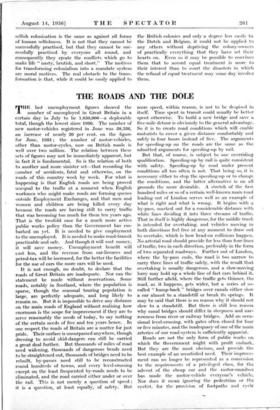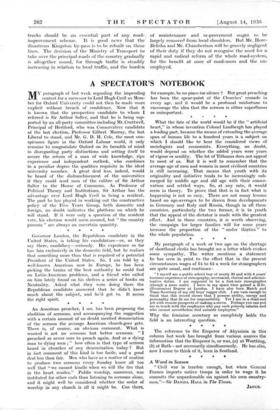THE ROADS AND THE DOLE
THE . last unemployment figures showed the number of unemployed in Great Britain in a certain day in July to be 1,650,000—a deplorable total, though the lowest since 1930. The number of new motor-vehicles registered in June was 38,536, an increase of nearly 20 per cent. on the figure for June, 1935 ; the number of motor-vehicles, other than motor-cycles, now on British roads is well over two million. The relation between these sets of figures may not be immediately apparent, but in fact it is fundamental. So is the relation of both to another and more sinister set—that recording the number of accidents, fatal and otherwise, on the roads of this country week by week. For what is happening is that English roads are being proved unequal to the traffic at a moment when English workmen who might make roads are forming queues outside Employment Exchanges, and that men and women and children are being killed every day because the roads are having still to carry traffic that was becoming too much for them ten years ago. That is the twofold case for a much more active public works policy than the Government has em- barked on yet. It is needed to give employment to the unemployed. It is needed to make road-transit practicable and safe. And though it will cost money, it will save money. Unemployment benefit will cost less, and the revenue from car-licences and petrol-tax will be increased, for the better the facilities for the use of cars the more cars will be used.
It is not enough, no doubt, to declare that the roads of Great Britain are inadequate. Nor can the statement be made without reservations. Some roads, notably in Scotland, where the population is sparse, though the seasonal touring population is large, are perfectly adequate, and long likely to remain so. But it is impossible to drive any distance on• the main roads of England without realising how enormous is the scope for improvement if they are to serve reasonably the needs of today, to say nothing of the certain needs of five and ten years hence. In one respect the roads of Britain are a matter for just pride. Their surface is unsurpassed anywhere, though dressing to avoid skid-dangers can still be carried a great deal further. But thousands of miles of road need widening, thousands of dangerous bends need to be straightened out, thousands of bridges need to be rebuilt, by-passes need still to be reconstructed round hundreds of towns, and every level-crossing except on. the least frequented by-roads needs to be eliminated, and the road carried either under or over the rail. This is not merely a question of speed ; it is a question, at least equally, of safety. But mere speed, within reason, is not to be despised in itself. Time spent in transit could usually be better spent otherwise. To build a new bridge and save a five-mile detour is obviously to the general advantage. So it is to create road conditions which will enable motorists to cover a given distance comfortably and safely in four hours instead of five. The arguments for speeding-up on the roads are the same as the admitted arguments for speeding-up by rail.
But that, of course, is subject to one overriding qualification. Speeding-up by rail is quite consistent with safety. Speeding-up by road under present conditions all too often is not. That being so, it is necessary either to stop the speeding-up or to change the conditions, and the latter alternative is on all grounds the more desirable. A stretch of the first hundred miles or so of a certain well-known main road leading out of London serves well as an example of what is right and what is wrong. It begins with a by-pass, marked out for a considerable distance with white lines dividing it into three streams of traffic. That in itself is highly dangerous, for the middle track is intended for overtaking, and vehicles moving in both directions feel free at any moment to draw out to overtake, which is how head-on collisions happen. No arterial road should provide for less than four lines of traffic, two in each direction, preferably in the form of two separated roadways. Further out of London, where the by-pass ends, the road is too narrow to carry three lines of traffic safely, with the result that overtaking is usually dangerous, and a slow-moving lorry may hold up a whole line of fast cars behind it. Still further afield, where the traffic gets thinner, the road, as it happens, gets wider, but a series of so- called " hump-back " bridges over canals either slow a car almost to a standstill or break its springs. It may be said that there is no reason why it should not slow to a standstill. But there is still less reason why canal bridges should differ in steepness and nar- rowness from river or railway bridges. Add an occa- sional level-crossing, with gates often closed for four or five minutes, and the inadequacy of one of the main arteries of our road-system is sufficiently apparent.
Roads are not the only form of public works on which the government might with profit embark. But they are the most obvious, and provide the best example of an unsatisfied need. Their improve- ment can no longer be represented as a concession to the requirements of a privileged class, for the advent of the cheap car and the motor-omnibus has made the motor-vehicle everyone's vehicle. Nor does it mean ignoring the pedestrian or the cyclist, for the provision of footpaths and cycle ,tracks should be an essential part of any. road- improvement scheme. It is good news that the disastrous Kingston by-pass is to be rebuilt on these lines. The decision of the Ministry of Transport to take over the principal roads of the country gradually is altogether sound, for through traffic is steadily increasing in relation to local traffic, and the burden of maintenance and improvement ought to be largely removed from local shoulders. But Mr. Hore- Belisha and Mr. Chamberlain will be gravely negligent of their duty if they do not recognise the need for a rapid and radical reform of the whole road-system, for the benefit at once of road-users and the un- employed.







































 Previous page
Previous page